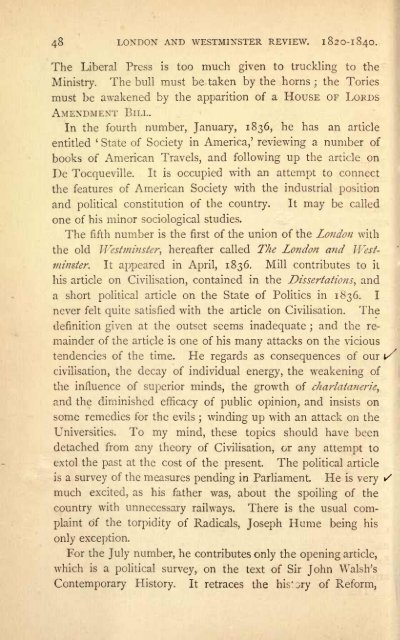John Stuart Mill: A Criticism with Personal Recollections
John Stuart Mill: A Criticism with Personal Recollections
John Stuart Mill: A Criticism with Personal Recollections
Create successful ePaper yourself
Turn your PDF publications into a flip-book with our unique Google optimized e-Paper software.
48 LONDON AND WESTMINSTER REVIEW. 1820-1840.<br />
The Liberal Press is too much given to truckling to the<br />
Ministry. The bull must be taken by the horns ; the Tories<br />
must be awakened by the apparition of a HOUSE OF LORDS<br />
AMENDMENT BILL.<br />
In the fourth number, January, 1836,<br />
he has an article<br />
entitled State of Society in America, reviewing a number of<br />
books of American Travels, and following up the article on<br />
De Tocqueville. It is occupied <strong>with</strong> an attempt to connect<br />
the features of American Society <strong>with</strong> the industrial position<br />
and political constitution of the country. It may be called<br />
one of his minor sociological studies.<br />
The fifth number is the first of the union of the London <strong>with</strong><br />
the old Westminster, hereafter called The London and West<br />
minster. It appeared in April, 1836. <strong>Mill</strong> contributes to it<br />
his article on Civilisation, contained in the Dissertations, and<br />
a short political article on the State of Politics in 1836. I<br />
never felt quite satisfied <strong>with</strong> the article on Civilisation. The<br />
definition given at the outset seems inadequate ; and the re<br />
mainder of the article is one of his many attacks on the vicious<br />
tendencies of the time. He regards as consequences of our<br />
civilisation, the decay of individual energy, the weakening of<br />
the influence of superior minds, the growth of charlataneric,<br />
and the diminished efficacy of public opinion, and insists on<br />
some remedies for the evils ; winding up <strong>with</strong> an attack on the<br />
Universities. To my mind, these topics should have been<br />
detached from any theory of Civilisation, or any attempt to<br />
extol the past at the cost of the present. The political article<br />
is a survey of the measures pending in Parliament. He is very<br />
much excited, as his father was, about the spoiling of the<br />
country <strong>with</strong> unnecessary railways. There is the usual com<br />
plaint of the torpidity of Radicals, Joseph Hume being his<br />
only exception.<br />
For the July number, he contributes only the opening article,<br />
which is a political survey, on the text of Sir <strong>John</strong> Walsh s<br />
Contemporary History. It retraces the history of Reform,

















